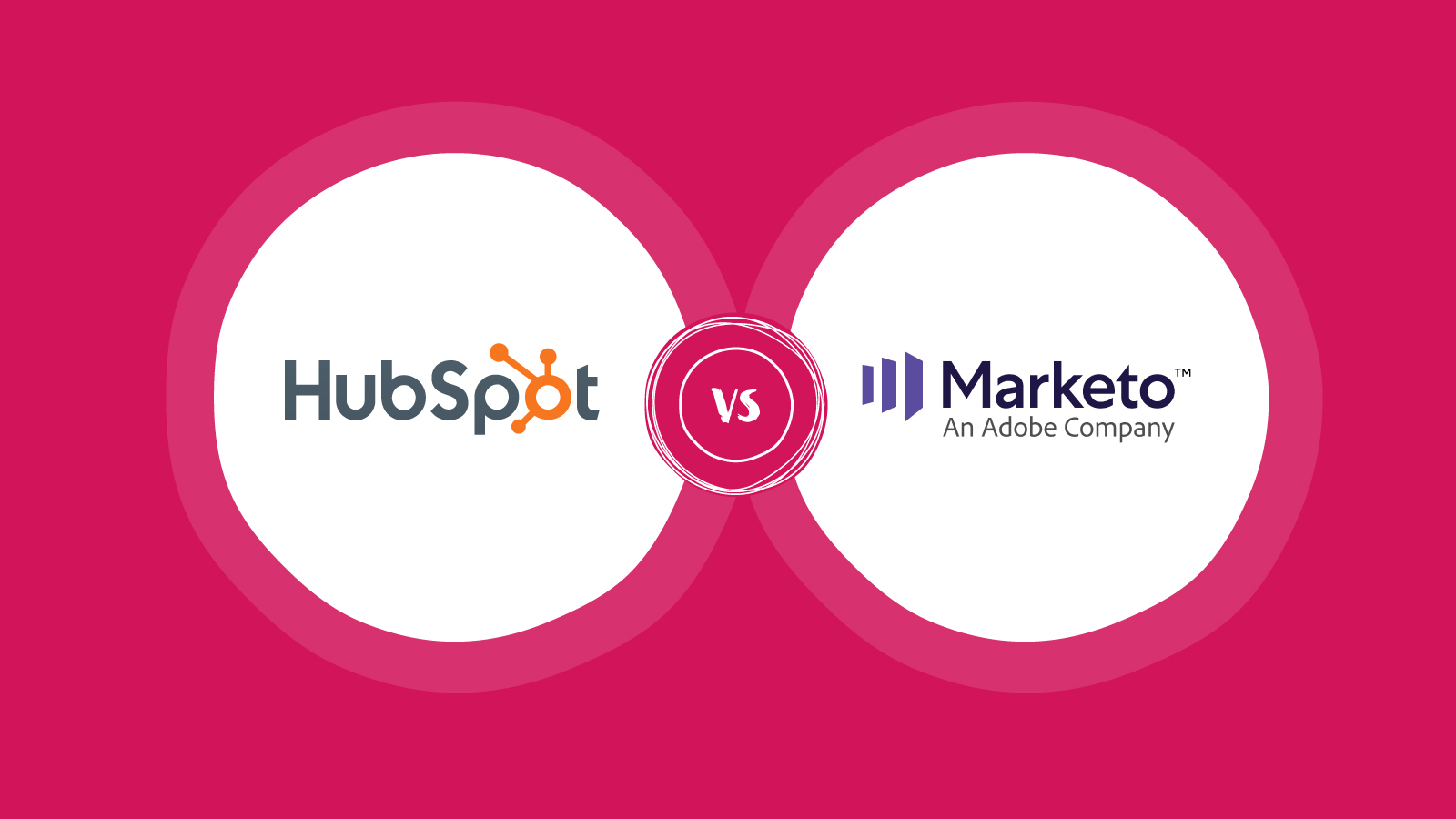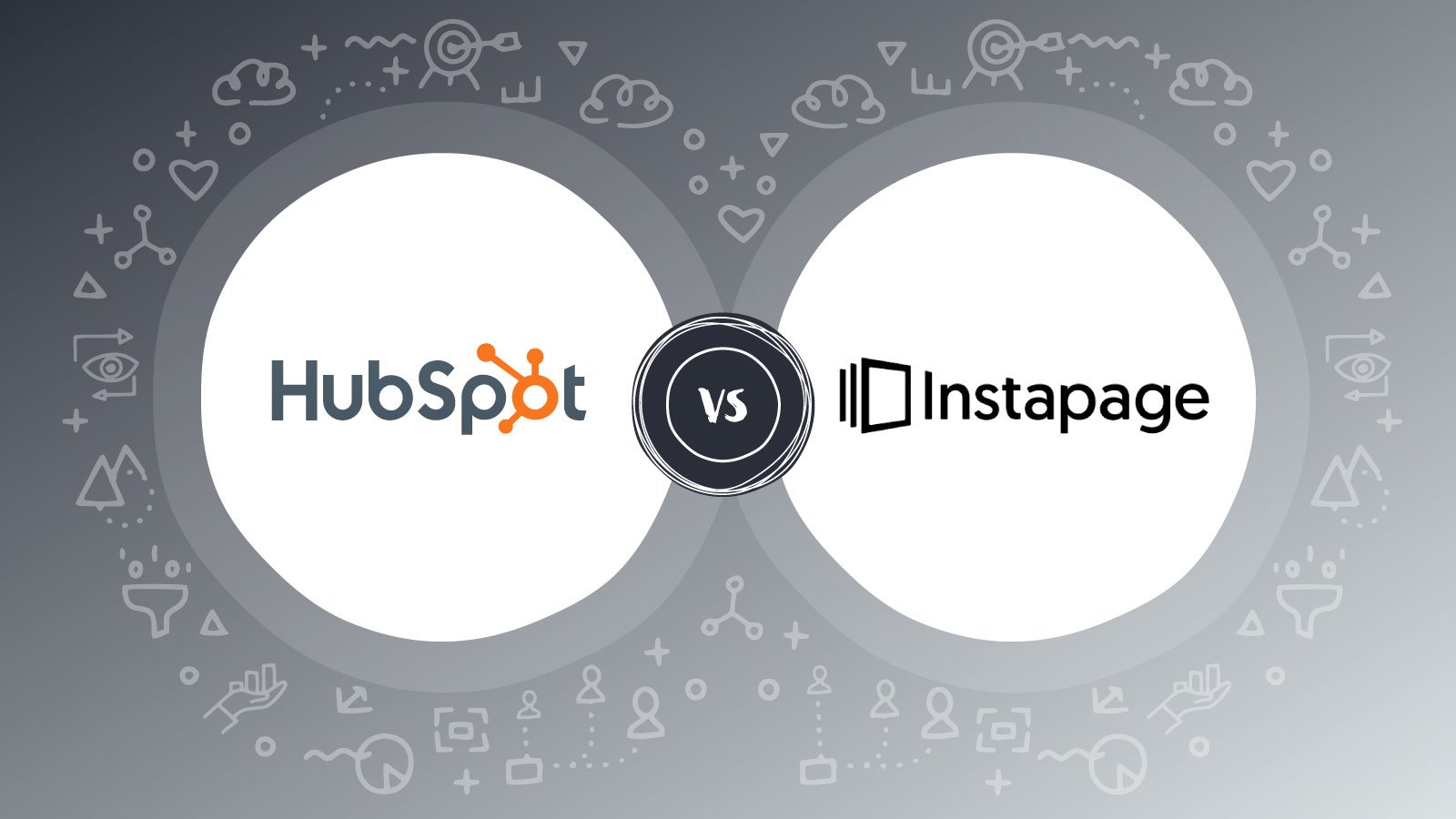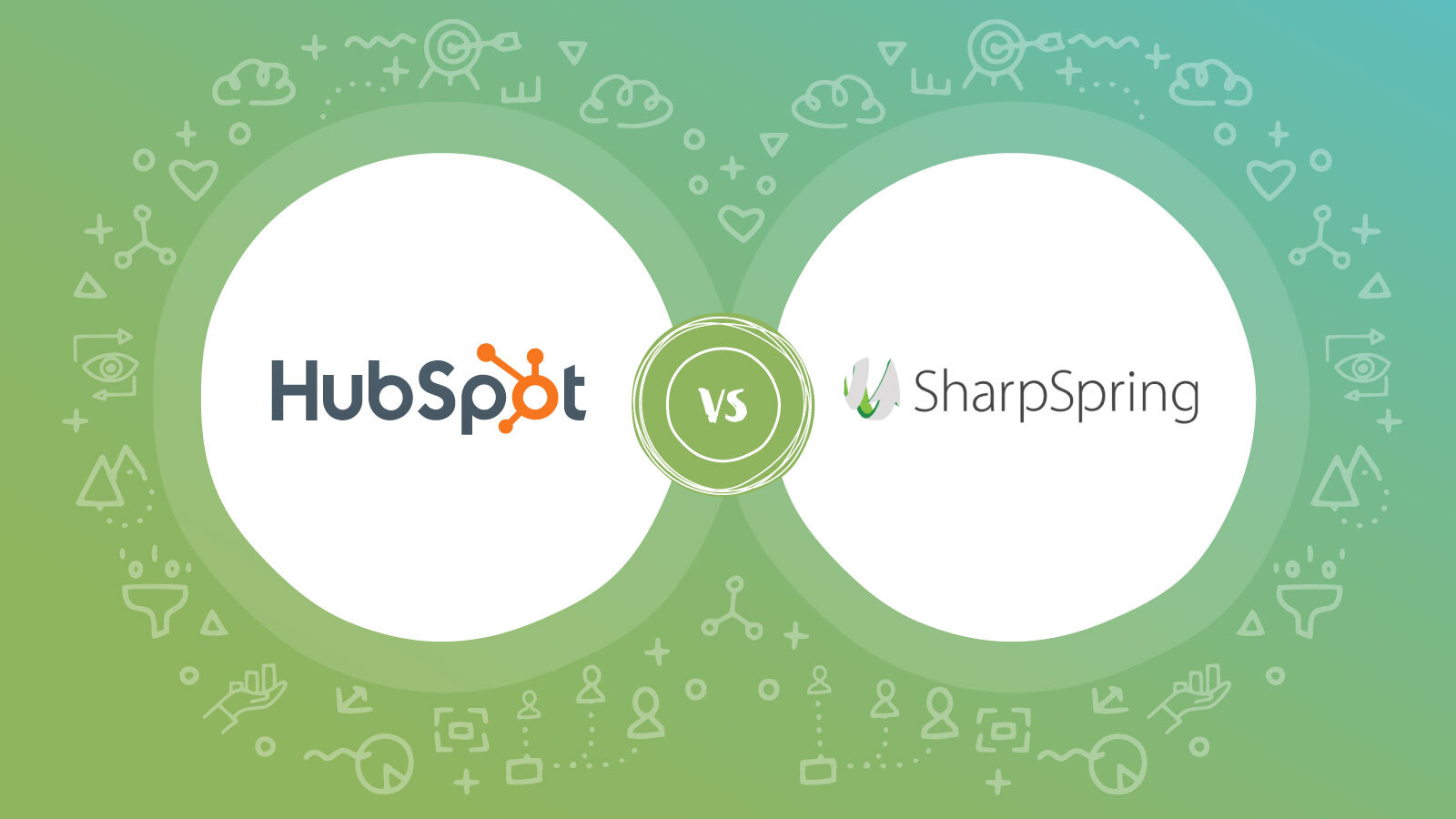Marketing automation and lead generation are today’s equivalents to yesterday’s traditional outreach and sales.
Most forward-thinking businesses use some form of marketing automation these days - in fact, recent studies show that around 51% of businesses currently use automation technology to optimise marketing processes in 2021, with more than half of B2B companies (58%) planning to adopt the technology in the near future. According to Gartner’s latest annual CMO Spend Survey, 68% of CMOs expected their martech budget to increase by 2021.
Marketing automation might not be a new trend, but it is certainly a growing one. All of these stats point to one thing - if you're not using marketing automation software for lead generation in 2022, you probably need to reconsider.
The most common form of marketing automation is email marketing automation. You can automate your entire email marketing process, from the initial opt-in to follow-up emails based on a customer’s behaviour and how they engage with your content. This means that when a potential lead opts in to receive your emails, you can send them a sequence of personalised messages designed to increase their interest in your product or service. According to an automation workflow, each campaign you run is controlled by a set of rules you have created that determine what content the recipient receives based on their actions.
Despite the fundamental urgency to adopt marketing automation software for lead generation in your organisation, it can be a complicated endeavour to choose a solution that fits your business requirements. There are many solutions on offer, all with different features, pros and cons, and you’ll need to make an educated decision - one which this blog will guide you in making.
What is the ideal marketing automation solution?
A growing misconception that marketing automation software is a cure-all solution for marketing growth, including generating new leads, has led many businesses to adopt sophisticated tools to automate the middle of their funnel, leaving them with no solution for generating new leads to nurture in the first place.
This has resulted in marketers buying email lists to nurture instead of generating their own inbound leads - a much more sustainable approach that creates the foundation for a healthy, long-term relationship with your customers.
This brings us to the ideal marketing automation solution - one that combines automation and strategy that enables you to nurture prospects with highly personalised content that engages, delights and converts prospects to clients.
Two marketing automation solutions offer features that support lead generation are HubSpot and Marketo. Read on to find out what they’re all about.
What does HubSpot offer?
HubSpot’s Marketing Hub is a Marketing Automation Software that enables users to create and deliver CRM-powered marketing. The powerful suite of tools is deeply integrated with your customer data and offers everything you need to create automated inbound marketing campaigns that consistently grow your business. Attract attention, convert more leads and report on your entire funnel from one central place.
HubSpot is ranked #1 in Marketing Automation by G2 Crowd, #1 Overall Best Product for Marketers by G2 Crowd, and #1 CRM Lead Management by Gartner.
What does Marketo offer?
Marketo is a single tool that provides email nurturing and automation, and requires costly integrations or other tools to help with marketing, sales and customer success. In addition, to get the most out of a single email automation tool, it requires deep integration with a CRM which needs to be maintained by your team.
Marketo is ranked #8 in Marketing Automation by G2 Crowd, and #4 by Gartner.
HubSpot vs Marketo - Which is better?
On your search for the ideal marketing automation solution for your business, it’s important to compare options to find the best fit. When stacked up against each other, both HubSpot and Marketo offer a wide variety of awesome features, however, there are some notable differences that will help you make a sound decision.
Let’s jump in and see how they compare across some of the most crucial marketing automation capabilities.
Functionality and Features
HubSpot’s Marketing Hub has an integrated set of tools designed to nurture prospects along the complete buyers’ journey. This includes website hosting, ads, landing pages, blogging, email, ABM, social, workflows, automation and attribution reporting. You will be hard-pressed to find a more feature-rich inbound marketing automation solution on the market.
With HubSpot, revenue and contact attribution reporting help your team track their performance at every stage of the sales process, from demand generation to closed deals. Attribution reporting makes it easier to make smarter, data-based decisions when allocating your budget by helping you identify the best-performing channels, and which ones might need more attention.
Marketing Hub is also the only marketing automation platform that offers top of funnel marketing automation tools, built inside of a world-class CRM. This unique combination is the most powerful way to deliver CRM-powered Marketing to help you attract, engage, convert and delight the right customers through personalised content delivered through the right channels.
G2 reviewers felt that HubSpot Marketing Hub meets the needs of their business better than Marketo Engage.
Marketo is an industry leader in marketing automation and has invested in deep integrations with many leading CRM solutions, like Salesforce. Since being acquired by Adobe, however, the company has not added any organically developed CRM platform features and has continued to invest in core functionality.
Marketo takes a more conventional approach to marketing and offers solutions to engage the right customers through behaviour tracking, to easily build and scale automated marketing campaigns, and to determine how marketing and channels impact revenue.
One G2 review in particular highlights HubSpot’s strengths in core features and functionality: “HubSpot is by far the easiest, most intuitive CRM platform for marketers that I have used. It’s lightyears ahead of Pardot and Marketo. If you’re working on demand/lead generation, this platform is essential for running campaigns at scale and tracking your success.”
Lead Generation
HubSpot is all-in-one marketing software that includes content creation, email, a CRM, and automation in a single platform. This means that you don’t need any additional integrations or custom development to start generating leads. With a strong focus on inbound marketing, HubSpot Marketing Hub excels at generating new leads through it’s intuitive and powerful top of funnel tools. You can publish your blog on HubSpot and track engagement through your CRM, incorporate SEO recommendations, manage all your ad campaigns, build and execute social media campaigns, host videos directly in HubSpot, or leverage chat bots to capture and qualify leads.
Marketo is not nearly as comprehensive as HubSpot, and is primarily designed for traditional email campaigns and marketing automation. In order to get more marketing benefits out of Marketo, you will need to integrate additional features like CMS, CRM, web forms, landing pages, and blogs.
One G2 reviewer writes: “Across three brands, I've loved being able to use HubSpot as my one-stop shop for social, email marketing, and lead gen. I love how easy it is to use to post for Facebook, Twitter, LinkedIn, Instagram, and our blog. I especially love that we can create workflows to perform nurture campaigns for lead gen for our B2B brands without having to use a separate app or software.”
Analytics
With HubSpot, all of your analytics are available in one place - from top of the funnel performance metrics all the way to multi-touch revenue attribution. With the ability to connect every customer interaction to revenue, you can make strategic decisions that are based on actual business value. Additionally, since reporting is available as a standard for all HubSpot tiers, no manual integration or additional costs are required to get started.
With Marketo you have the ability to get reporting from high-level engagement analytics to basic revenue reporting, however, for attribution & ROI reporting you will need to integrate Marketo with a specific attribution tool such as Bizible.
Account-based Marketing
With HubSpot, your ABM strategy can be easily implemented with tools to help you identify target accounts, attract key accounts, engage and deepen relationships, communicate across marketing and sales, and measure performance of your powerful ABM program. These features are all available in both Sales Hub and Marketing Hub Pro + Enterprise at no additional cost.
Marketo's ABM features are only accessible with a paid add-on, which provides individual licenses to users who require access. Additional integrations are required to align Sales and Marketing, which can cause friction and slow down the lead generation process.
Customer Support
Customer service is one area where HubSpot really shines. HubSpot consistently goes the extra mile to provide world-class customer support and self-help resources, including HubSpot Academy - ranked one of the top online learning platforms in the world. When comparing the quality of ongoing product support, G2 reviewers felt that HubSpot’s Marketing Hub is the preferred option.
Marketo provides a basic level of support with all subscriptions, and offers paid plans to access more complete coverage. Online reviewers, however, consistently rate Marketo support below that of HubSpot’s average. They make up somewhat with access to Marketo University, which features classes to help users get started.
Perhaps summing up many reviews about Marketo is this G2 review: “You NEED a dev or an experienced marketing automation expert. This is NOT a platform that comes with any support worthy of being called adequate. You will have to wait hours or days before the 'live chat' actually has an available agent. The only saving grace is the community which is better than the actual support.”
Pricing
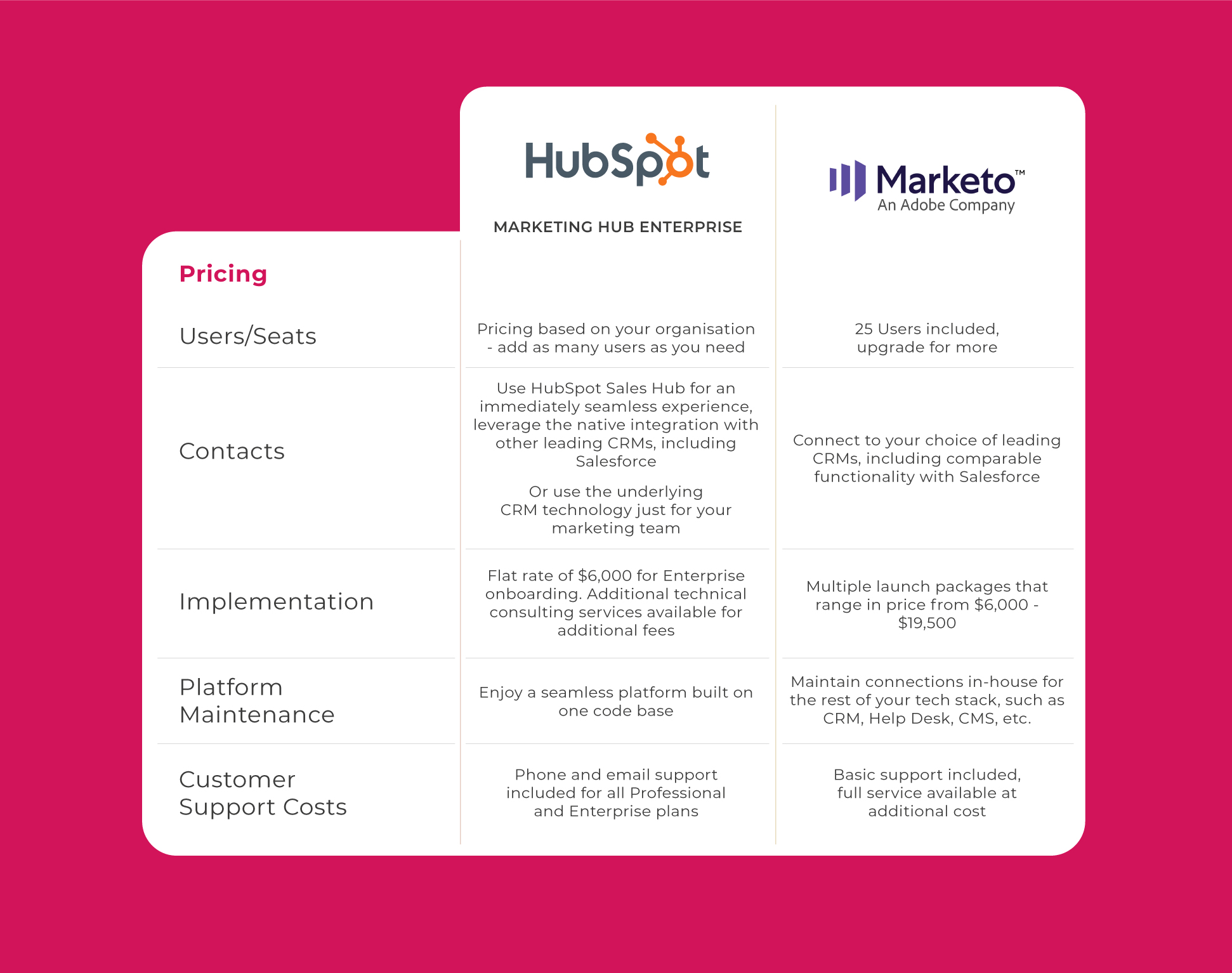
*Pricing last updated in October 2021
Are you ready to decide?
G2 reviewers compare the two solutions on a number of critical areas as follows:
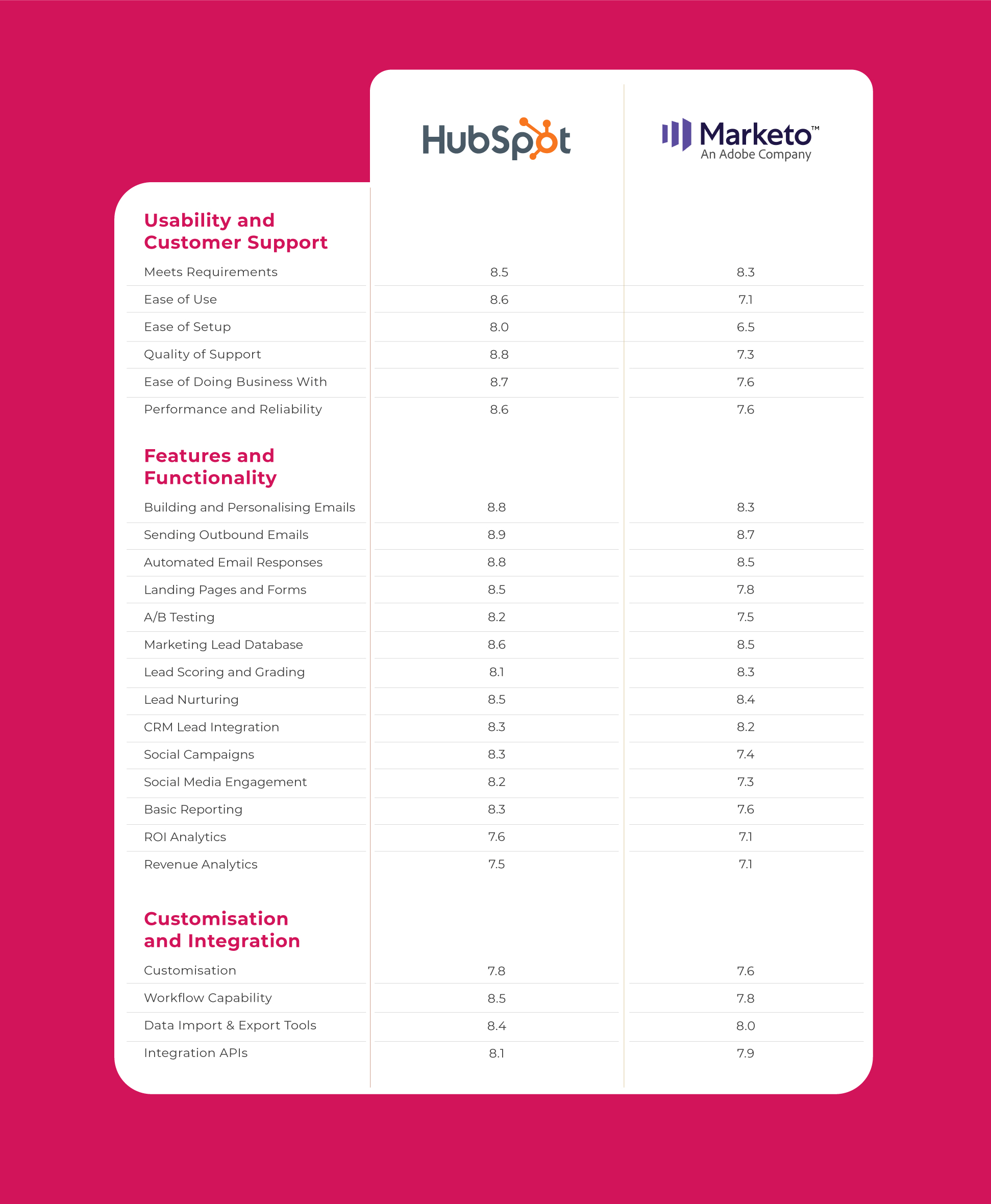
In closing, HubSpot comes with all the tools you need to generate leads, create a delightful customer experience and drive results for your business. With HubSpot’s Marketing Automation platform, CMS and CRM available on one platform, your teams are able to generate leads more effectively and efficiently. Marketo, on the other hand, requires additional integrations and resources to add real value to the lead generation process.
Explore our guide on how to choose the right CRM for your business.
Looking for more guidance on your marketing? Our team is here to help, so contact us today!

